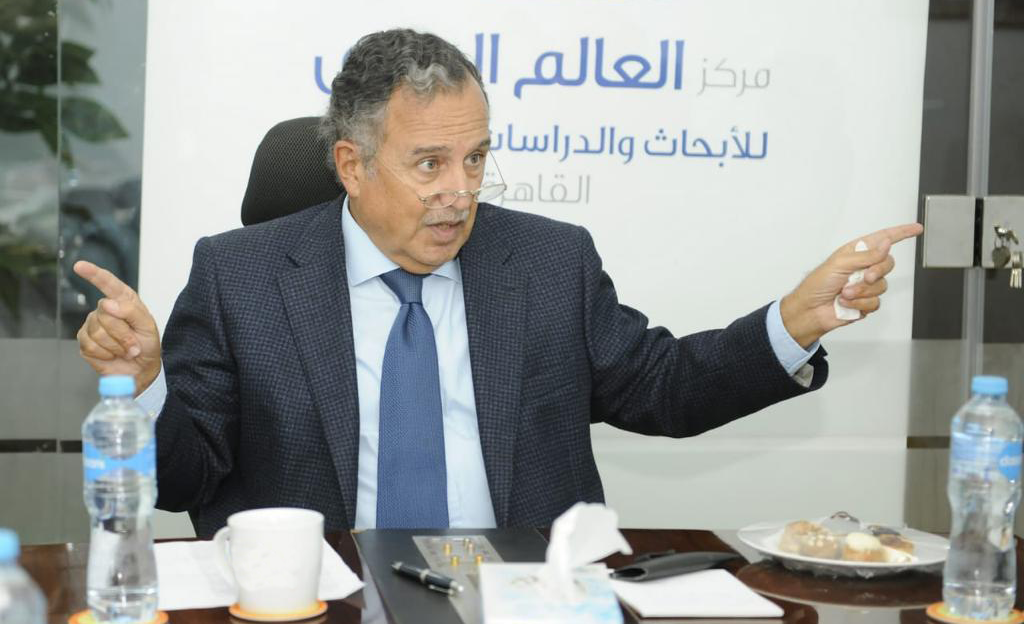On December 7 the Arab World Center for Research and Advanced Studies organized a panel session on the US withdrawal from the Middle East and its repercussions on Arab countries. The Center hosted the former Egyptian Foreign Minister Nabil Fahmy as a keynote speaker in the session, in addition to a number of experts on international and regional issues, including Ms. Karen Aboul Kheir, Dr. Mohamed Ezz El Arab, Dr. Mohamed Abbas Nagy, Mr. Ahmed Oliba, Mr. Ahmed Kamel El Beheiry, Mr. Amr Abdel-Aty, Mr. Mohamed Bassiouni, and Mr. Mohamed Elfeki.
Mr. Nabil Fahmy started the session by pointing out that any analysis of US foreign policy must take into consideration a number of basic facts, such as the country’s significant size and strength. The United States occupies a large geographical area, with continental dimensions, and has a large and diverse population. With the significant size of its economy, its military power, its interventions in various regions around the world, US foreign policy is concerned with a wide range of issues and regions.
Despite what the world perceives as political differences between the Democratic and Republican parties, US foreign policy remains governed by pragmatic thinking, and decisions are taken according to calculations of costs and profits, gains and losses .Moreover, the idea of American exceptionalism, that the US occupies a unique place in the international system, with which no other country can compete, is still dominant in American society.
This view has led the US to refrain from joining certain organizations, such as the International Criminal Court, as it does not accept to be held accountable by any external authority. The US follows its own laws, irrespective of international law.
Recent years have seen the United States undergo what Ambassador Fahmy characterized as a search for identity. This has been reflected in Americans’ choices of presidents in the past years, and the shift between presidents of clearly different orientations and ideas. In this context, the election of former US President Donald Trump constituted a phase in the search for American identity. It is of note that the search for American identity reflected in some way on US foreign policy, leading to contradiction and ambiguity in the nature of its involvement in some regions.
Although many have argued the US has signaled its withdrawal from the Arab region, Ambassador Fahmy believes the United States will not withdraw completely. The US is in the process of reordering its policies in the region, but still has interests here that cannot be overlooked, and that necessitate its continued presence. However, it must be noted that the Middle East has declined in importance for Washington, a development that began years before the Biden administration, especially with the end of the Cold War and the decline in the importance of the region’s oil for the United States.
Ambassador Fahmy noted that the change in US policy in the region is linked to the decline in direct military involvement in its crises. The Biden administration does not wish to intervene in the region’s developments and does not perceive anything to be gained from sacrificing its material and human resources in the conflicts of the Middle East. For example, while Washington will continue to monitor the situation in Syria, is not expected to play an active role there. It is likely to allow humanitarian action and support, in which the Syrian regime is involved, without imposing sanctions. At the same time, Washington will continue to monitor the region’s interactions to ensure that the influence of competing international powers, such as Russia, does not rise beyond certain limits, especially in Libya. The current US administration will not reverse Trump’s decisions on regional issues, but may not strictly uphold them so as to allow some room to maneuver. Examples of these decisions include the Trump administration’s decision regarding Western Sahara, as well as Trump’s decision to transfer the US embassy to Jerusalem.
In conclusion, Ambassador Fahmy argued that Arab countries should take the lead in reshaping the region instead of allowing external actors to do so. Arab cooperation is crucial, and Arab countries must work together to develop a unified strategy to confront various threats. This path does not require absolute congruence between the policies and positions of the various countries, but rather determination to recognize, and act upon, the existence of shared interests. Arab countries will have to present their own vision for the security of the region, avoiding dependency on others, as this weakens their ability to confront internal and external threats.


